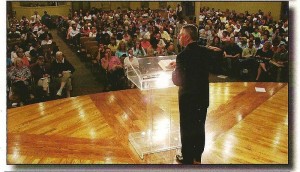
But the question remained. It was an interesting one for me who has studied homiletics. I immediately began asking some interesting questions and interacted with some assumptions that many have. First, how many Adventists have you heard condeming thsoe who are not of that faith for preaching sermons that “don’t say anything.”
What is it to preach something? Some people think that a lecture on religious themes is a sermon. How many of you have listened to a preacher of that school. You end up with a long 60 minute distilling of a doctrine that is meant to enlighten the mind. Yet the heart is unstirred. Often these lectures have very little practical value. At the end of the day, tell me how this doctrine you are preaching makes a difference in my daily life. That is your job preacher.
Another issue that might be going on is that the questioner might be thinking that the worship sermon is the only time to teach doctrines. So we must do it then. It is very problematic to try to have the preaching moment to be your whole training. What about Sabbath School? Do you use that as a traning opportunity or simply a preaching opportunity for your local elders? What about Wednesday Night Prayer meeting. I like how our Baptist sisters and brothers normally call this Wednesday Bible study. Do you have prayer? Do you have study?
I am actually hearing about churches around doing training of their members. Here in Nashville Riverside SDA Church under Furman Fordham seems to have a training program to get people on the right track. The point that I am making is that it is unreasonable to expect the one hour worship sermon to bear the brunt of the theological training in a church.
But more than that, should it even be. I would argue that the sermon should foster an encounter between the people, God, and scripture. It should not be simply to learn facts for the mind. It should be an encounter that is informed by theology and the other things that we have learned, but no it is more than that. It is a time for the intellect and the emotions to celebrate the good news of God’s reign on this Sabbath day.
So know and understand your theological understandings which includes Biblical wholeness (State of the Dead). Yes, go head on and get a deeper understanding of the theology of Sabbath and its great need at this time. Yes understand your theology, but don’t just preach it. Yes preach it, but then always take the time to Celebrate it. Turn the page. Be the Cheif celebrator of the implications of the truth you have presented in the sermons.
AT the end of the day. You are not preaching an “Adventist sermon” merely when you give the facts of the Sabbath as being the Seventh Day. You are preaching an “Adventist sermon” when you use the principle of Sabbath rest to inform how you treat people on this day and the rest of the week. you are preaching an Adventist sermon when you use the princple of Sabbath rest as a theological tool to interpret what it means to live a faithful life in a world that is trying to remove all our rest.
Yes, I am calling for you to tell your people what these doctrines mean. Don’t just tell them to me and tell me I better beleive them and sit down as if you have done something. No work to foster an experience with the Lord whom we understand better because of something about the Sabbath.
So step one…stop thinking that an Adventist sermon is a Bible study that gives proof texts for a doctrine….
So I would argue that the whole idea of a sermon as merely a lecture is preoblematic. But then we have the other side where doctrine plays no part in the


 Calvin Rock speaks about the necessity for Black Preachers to make use of their
Calvin Rock speaks about the necessity for Black Preachers to make use of their